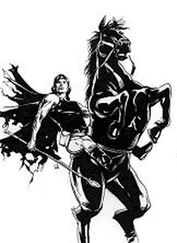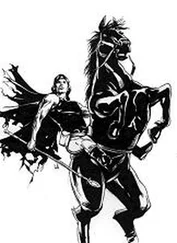Jack Chalker - Priam's Lens
Здесь есть возможность читать онлайн «Jack Chalker - Priam's Lens» весь текст электронной книги совершенно бесплатно (целиком полную версию без сокращений). В некоторых случаях можно слушать аудио, скачать через торрент в формате fb2 и присутствует краткое содержание. Год выпуска: 1999, ISBN: 1999, Издательство: Del Rey / Ballantine, Жанр: Фантастика и фэнтези, на английском языке. Описание произведения, (предисловие) а так же отзывы посетителей доступны на портале библиотеки ЛибКат.
- Название:Priam's Lens
- Автор:
- Издательство:Del Rey / Ballantine
- Жанр:
- Год:1999
- ISBN:0-345-40294-4
- Рейтинг книги:3 / 5. Голосов: 1
-
Избранное:Добавить в избранное
- Отзывы:
-
Ваша оценка:
- 60
- 1
- 2
- 3
- 4
- 5
Priam's Lens: краткое содержание, описание и аннотация
Предлагаем к чтению аннотацию, описание, краткое содержание или предисловие (зависит от того, что написал сам автор книги «Priam's Lens»). Если вы не нашли необходимую информацию о книге — напишите в комментариях, мы постараемся отыскать её.
Priam's Lens — читать онлайн бесплатно полную книгу (весь текст) целиком
Ниже представлен текст книги, разбитый по страницам. Система сохранения места последней прочитанной страницы, позволяет с удобством читать онлайн бесплатно книгу «Priam's Lens», без необходимости каждый раз заново искать на чём Вы остановились. Поставьте закладку, и сможете в любой момент перейти на страницу, на которой закончили чтение.
Интервал:
Закладка:
There was a small fire pit, but it was well away from the rest of the village and only a wisp of smoke could be seen from it. These people had an inordinate fear of fire, and while they used it, particularly on Eden, they used it minimally.
At one time there appeared to have been taller earthworks as a kind of outer wall, but these had now been so dug through with access paths that they were more a boundary than a hindrance.
As with the others, the people painted their faces and bodies, sometimes with dyes but sometimes with permanent and elaborate tattoos. They wore no clothing. The women had long hair but the length did vary once it reached the shoulders; the men tended to wear shoulder-length hair and medium-full beards, but clearly hair and beards were cut and trimmed.
The newcomers had already seen how some great sea beasts could sneak in under the sand and present a nasty danger to anyone on it, yet these people seemed to have no fear of them. There weren’t too many coastal communities, but the few that there were seemed to have found a way to divert the creatures or keep them well at bay. Indeed, the coastal types were mostly fishers, who used small, rough dugout canoes to spread nets woven of hairy vines native to the more junglelike interior. They used the sea creatures—“fish” was a relative term for creatures that filled the same general niche and were edible—as trade goods for dyes, fruits, vegetables, cooking oils, and the like from villages farther inland.
The cliffs seemed to be almost solid salt.
So far they had contacted a number of tribal groups on Eden—and particularly in the Great Basin region, the vast bowl-shaped area ringed by high mountains—looking for any traces of the expedition that had been sent in and had performed its duty.
The two-person shuttle craft did one more lazy circle, then the uniformed woman in the left seat said to her similarly attired male companion, “Let’s put down. This is the most sophisticated-looking group we’ve seen on the coast yet, and the closest to the site of old Ephesus.”
“You’re the boss,” the man responded, and hordes of young children scattered and people came from just about everywhere pointing to the sky as they descended.
“Jeez, they really make a lot of babies around here,” the woman noted.
Her companion shrugged. “After dark there doesn’t seem an awful lot else to do.”
The shuttle gave a thump and was then on the ground. The hatch opened, and a set of steps came out, leading to the ground on the side away from the village wall.
They expected to see everybody start running or hiding behind the battlements. Instead people, particularly the kids, rushed to them with laughing, smiling faces.
Amid childish greetings that amounted mostly to “Hello, lady! Hello, man!” there were a few older faces, mostly women but at least one man who, even through the beard, had a somewhat familiar look to the uniformed woman.
He made his way through the kids, who had to be dissuaded from climbing into the shuttle by automatically closing the hatch from the outside, and he finally got to the two of them.
“Hello,” he greeted them. It was an oddly accented voice, but firm and deep and clear. “They said you would come one day, but most of us no longer believed it.”
She stared hard at him. “Mister Harker? That can’t be you behind that beard, can it?” She knew it couldn’t be—he was too young for that—but he sure looked a lot like the warrant officer.
The young man laughed. “I think you want my grandfather. I’m afraid he’s not here right now, but my grandmother is overseeing the salting of the morning catch. Would you like me to take you to her?”
“Your grand—” She caught herself. “Yes, please. We would like to meet her.”
“We don’t use long names around here,” the young man explained. “It’s not worth it. And, as I understand it, they never could decide on what family name to use, so they finally just said to heck with it and haven’t used much since. Instead, when they founded this village they named it Treasure. That’s all we’ve called ourselves since I was born. The Treasure People. I’m Curly, ’cause of my curly hair. ’Course, half the people here got curly hair, but I got the name first.”
“Well, I’m Barbara, and this is Assad. We’ll keep it on a first-name basis, then,” the woman said.
A lot of the villagers looked very, very related; the new arrivals had to wonder just how close some of them were. Still, there was some variety, and it was clear that they had sprung from more than two people.
An older man, with deep, ancient scars carved in his skin and a body covered with faded tattoos, his hair and beard gray, but who looked of more Mediterranean ancestry than Curly did, got to his feet with the aid of a carved walking stick and came toward them. He limped from what was clearly a very old wound, but he seemed not to notice.
“Hello!” he called to them. “I am so happy to see that you arrived before I was gone to God.”
“We seem to have been expected,” Assad commented, smiling and relaxed. “Are you from the original expedition?”
“In a manner of speaking,” he replied. “But I was born and raised here, before the Liberation. I was simply lucky enough to be there and be a part of it. I should have died, but God decided at the last minute that somebody had to tell the story of those who were there at the end. I’ve waited many years to tell it to somebody.”
“We will certainly listen,” Barbara assured him, “and people who’ll follow us will interview everybody and record it for future generations. You know what I mean by that?”
“I have been told that the voice and even the image can be somehow captured and shown elsewhere, yes, but I never saw it and I got to admit it’s a little wild to think on.”
“Uncle, these people want to see Grandmother,” Curly put in.
“Huh? Oh, all right, sure. Let’s all go over. She’s right over there.”
They headed toward an older woman who was still in excellent physical shape but who clearly had lived long and been through a lot. Her hair was almost white, and her skin was weathered and wrinkled, but there was a tightness to the form and she still was a handsome woman. She was giving instructions, mostly critiques, to younger women packing fish in salt loaves, when she heard them and turned.
“Hey, Kat! I thought you’d be running for the air boat!” the gray-haired man called.
She turned and smiled. “Littlefeet, one of these days you’re going to grow up! I knew they’d come in their own time.”
The two officers stared. Finally, Assad said, “You are not Katarina Socolov, are you?”
The old woman smiled. She didn’t have all her teeth anymore, but she had more than many her age. “Yes, although it’s been a very long time since anybody called me anything more than `Kat,’ or more often Mom or Grandma.”
“But—we’ve been searching all over for you and the others! There are stories about you around the region, but we thought we’d never find you!”
“Well, we’ve been right here since six months or so after the big bang. Couldn’t do much more. By then I was pregnant with this hairy bastard’s father,” she gestured toward Curly, “and I was scared to death as it was. Never thought I’d ever have a kid at all. We set up right here, the four of us, after Littlefeet reached us at the Styx.”
“Four? There are other survivors?” Assad pressed.
“Well, not really. Depends on how you look at it, I guess. There’s Gene, of course—he’s Curly’s grandfather, as well as a lot of others you see around here—and Father Chicanis was around for some time, but he died a year or two ago. Spent half his life trying to reestablish the true faith on Eden, only to fail miserably not only at that but even at keeping it up himself. See, those Titans, they were using everybody as guinea pigs. Mostly it was keeping everybody out in the wild, well, wild. Raw material for their experiments, we figure. They used a broadcast net and some biochemical agents to do the job in a general sense. Worked on us as much as it had on the ones born and raised here. Still around, so maybe it’s inside the genes now or something. Weird stuff, too. Like extreme claustrophobia. No buildings, you see? We built a nice big straw and bamboo hut—we call ’em straw and bamboo, even though they aren’t really—using designs I remembered from my anthropology studies. Real pretty thing, and sturdy. But we couldn’t spend the night in it. In fact, we couldn’t spend ten minutes in it before we were all climbing the walls and rushing outside. That kind of stuff. It actually gets worse as you get older, too. I don’t think we could ever go down that tunnel now, and even that big factory is the stuff of nightmares. I don’t know how Littlefeet and Spotty did it. More force of will than me, anyway.”
Читать дальшеИнтервал:
Закладка:
Похожие книги на «Priam's Lens»
Представляем Вашему вниманию похожие книги на «Priam's Lens» списком для выбора. Мы отобрали схожую по названию и смыслу литературу в надежде предоставить читателям больше вариантов отыскать новые, интересные, ещё непрочитанные произведения.
Обсуждение, отзывы о книге «Priam's Lens» и просто собственные мнения читателей. Оставьте ваши комментарии, напишите, что Вы думаете о произведении, его смысле или главных героях. Укажите что конкретно понравилось, а что нет, и почему Вы так считаете.












